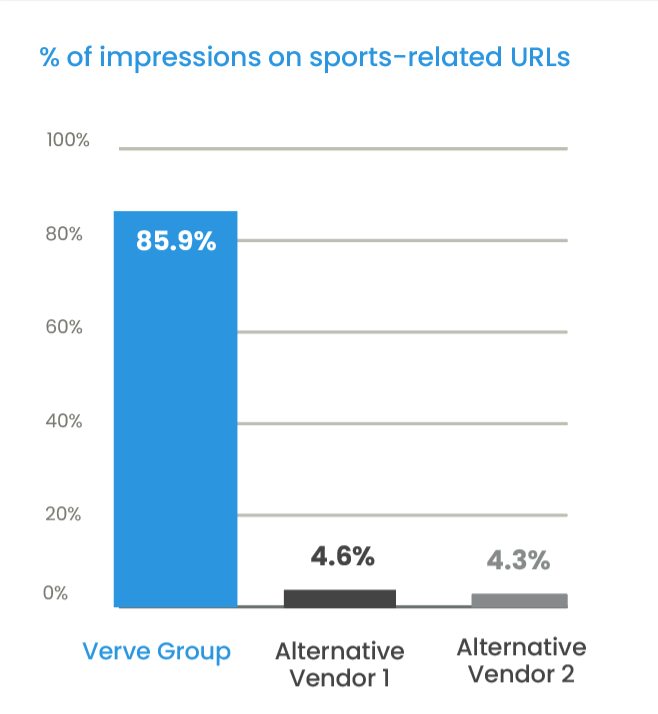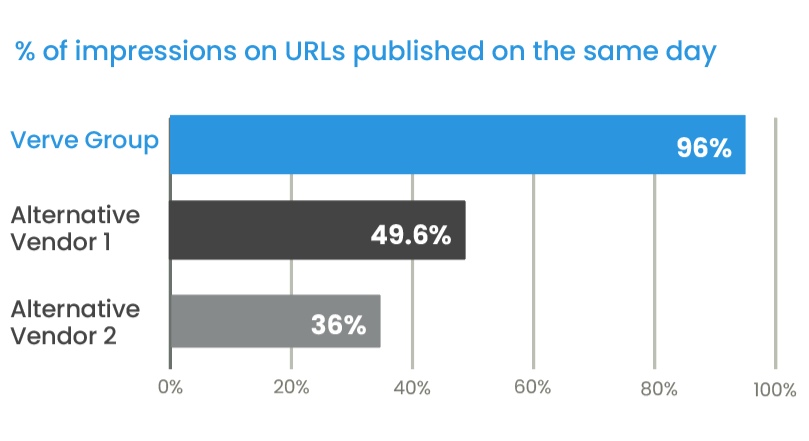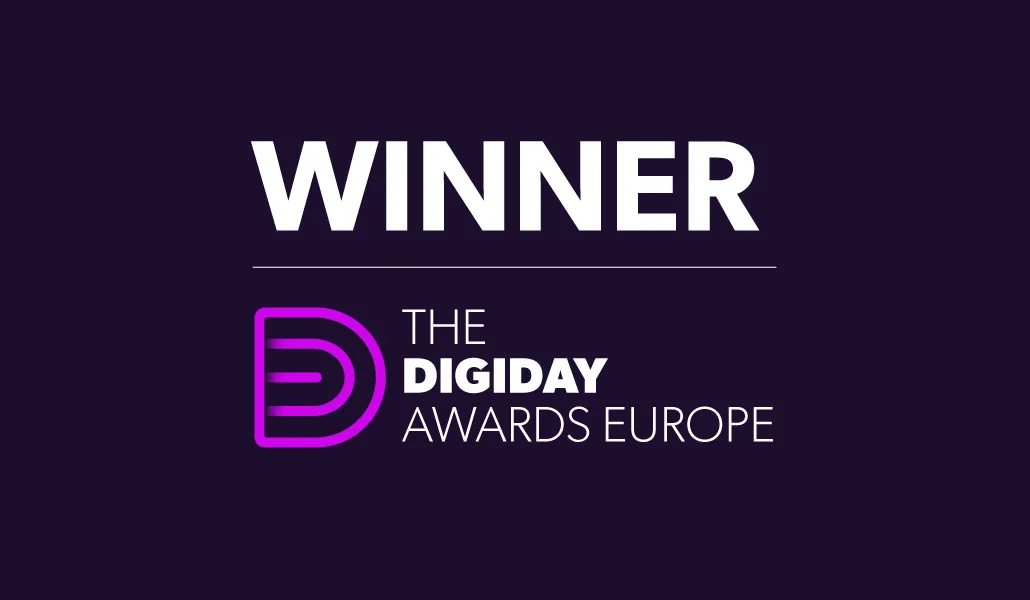Choose wisely: The 36X difference between contextual solutions

It’s a simple question: How do different contextual solutions deliver on the promise of targeting fresh, relevant content?
The answer is simple, too: Advertisers don’t always get what they pay for. But the story of how we answered this question is full of twists and turns, with surprising results and takeaways.
Read on for the scoop on groundbreaking research that shows how three different contextual solutions succeeded (or failed) at targeting new and relevant content. You’ll also find out why Verve’s Moments.AI won Digiday Awards Europe’s “Best Contextual Targeting” this year!
TL;DR: Not all contextual platforms actually target content that’s new and experiencing peak engagement. 96% of ad impressions delivered by Verve’s Moments.AI appeared on URLs published in the last 24 hours. Let’s just say the two other competing solutions didn’t even come close.
Why do we need more research on contextual advertising?
With privacy in focus for marketers and publishers, contextual solutions are popping up to fill the void left by cookies and other identifiers. While it’s great to have options, it can be hard to know which contextual targeting platform will best hit KPIs.
Marketers want contextual targeting to perfectly align their ads on the latest, greatest content. However, most content becomes “old news” before it’s even crawled, indexed, and targetable for many contextual solutions. In fact, a recent analysis of 27 million news articles found that 80% of all pageviews happen in the first 24 hours, and most of the remaining 20% happen within the first 48 hours.
To help advertisers and DSPs make informed decisions when choosing a contextual advertising solution, Verve conducted a study to unearth concrete data. We also wanted to use the research to better understand marketers’ pain points and identify opportunities for elevating contextual advertising.
Understanding speed and real-time relevance: methodology
Brands looking to appear alongside content at peak engagement must prioritize speed. Speed, or recency, serves as a reliable proxy for audience value and interest. The value of timely content and its reach diminishes rapidly. The quality of contextual impressions (and ad spend efficiency) relies on content freshness. But can all contextual targeting platforms perform?
To find out, the researchers designed an experiment and launched three contextual campaigns comparing Moments.AI against two major market players.
- Setup: A third-party DSP was selected for unbiased campaign delivery and performance analysis.
- Targeting: Each campaign specifically targeted sports content for 24 hours in the same regions of the UK and Germany, starting on a Saturday when sports media consumption is highest.
- Contextual segments: The campaigns were identical, with each vendors’ contextual segment as the only variable.
- Data analysis: The neutral DSP measured impressions served on URLs published on the same day and impressions on sports-related URLs. To avoid inflated metrics, news homepages (e.g., dailymail.co.uk) didn’t count as sports-related (even if the page had some sports content). This makes sense: there’s no way to know what percentage of users landing on a news homepage are seeking sports content.
Results: too good to be true?
The experiment’s results were so dramatic that the research firm wondered if something had gone amiss with campaign delivery.
To confirm the targeted content was indeed sports-related, the researchers manually inspected the URLs responsible for the top 90% of impressions. They also collaborated with the third-party DSP’s support team to confirm that there were no errors in any technical integration with the suppliers. Moments.AI had simply outperformed the competitors by successfully targeting relevant content faster and more accurately.
The campaign had two primary key success metrics: percentage of impressions delivered on same-day URLs, and the percentage of impressions appearing on sports-related URLs. When analyzing these metrics together, Moments.AI outperformed the two market leaders by 36X. Here’s how it breaks down:
Relevance
Moments.AI targeted sports-related URLs with 85% accuracy. The two alternative contextual targeting solutions delivered less than 5% of ad impressions on sports-related URLs.

Recency
96% of all impressions delivered by Moments.AI appeared on URLs that had been published in the last 24 hours. The two alternative contextual solutions served 49.6% and 36% of impressions on same-day URLs, respectively.
Even more surprisingly, 17.75% of Alternative Vendor 2’s total ad impressions showed up on URLs published in 2022 or earlier, including some URLs as old as 2019.

More data, faster: how Moments.AI works
Speed is the competitive edge for advertisers using contextual targeting. While many platforms rely on superficial data to analyze content (think keywords and basic categories), targeting isn’t even possible until that content is indexed and available. What’s worse, indexing can take hours or even days. Unlike most contextual solutions, Moments.AI’s breakthrough machine learning digests metadata, images, keywords, semantics, and much more — in just 10 milliseconds. That means brands using Moments.AI can target content in real time. Audiences see ads alongside content they’ve already chosen to engage with, boosting brand affinity and recall.
Armed with objective proof of Moments.AI’s excellence, Verve submitted the research for consideration under the “Best Contextual Targeting” category in the 2023 Digidiay Awards Europe. Digiday announced this month that Verve’s Moments.AI is the winner of this prestigious award.

Impact and insights
The drastic differences in speed and relevance validate that marketers can — and should — set a higher bar for their contextual campaigns.
While the study specifically examined sports-related content in the UK and Germany, the underlying principles of contextual targeting remain relevant across industries and regions. The experiment’s results underscore just how important it is for marketers to accurately target new and relevant content — the key to effective contextual advertising.
In this new era of contextual targeting, bigger isn’t necessarily better. Moments.AI’s performance against two other go-to heavyweights proves that new solutions are shaking up the advertising world. Rather than defaulting to big-name adtech providers, marketers should choose contextual solutions based on data and testing.
Want to see what Moments.AI can do for your contextual campaigns? You can download the research for future reference, or feel free to get in touch with us. We’re always happy to talk contextual.